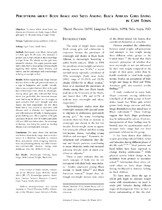Perceptions about body image and sizes among Black African girls living in Cape Town
Abstract
OBJECTIVE: To assess beliefs about body size (fatness and thinness) and body image in Black
girls aged 10–18 years living in Cape Town.
DESIGN: Exploratory using qualitative methods.
SETTING: Cape Town, South Africa.
METHOD: Participants were Black African girls
(n5240), aged 10–18 years, who attended 5
primary and 6 high schools in Black townships
in Cape Town. The schools and the girls were
randomly selected. This paper presents qualitative
data from 6 focus groups among 60 girls
regarding their beliefs about thinness and
fatness, and the advantages and disadvantages
of being overweight or thin.
RESULTS: Beliefs regarding body image indicate
that two thirds of the girls perceived fatness as
a sign of happiness and wealth. Socially,
fatness was accepted but one third of the girls
had contradictory views about its advantages.
Among obese girls who believed that being
obese was preferable, the dominant reasons
were that being fat allowed one to engage in
sport activities that need strength and also
makes one look respectable. On the other
hand fatness was viewed as associated with
diseases such as diabetes and hypertension
and with increased difficulty in finding appropriate
clothing sizes. Three quarters of the girls
associated thinness with ill health particularly
HIV and AIDS and tuberculosis. An advantage
of thinness was being less prone to develop
chronic non-communicable diseases.
CONCLUSION: The study shows that opinions
and beliefs about body image start in adolescence.
It is therefore important to consider
these perceptions when designing interventions
for preventing obesity and other chronic
non-communicable diseases during early
childhood

